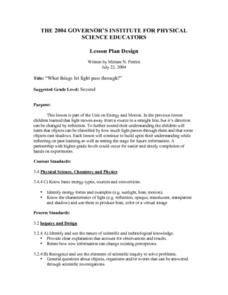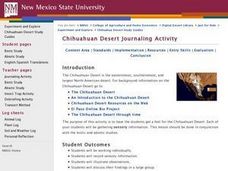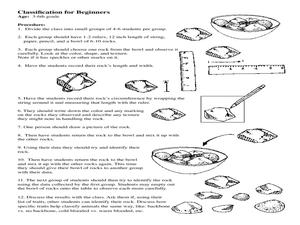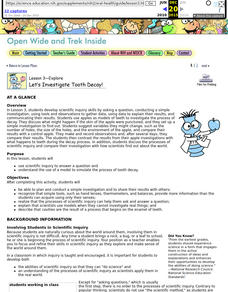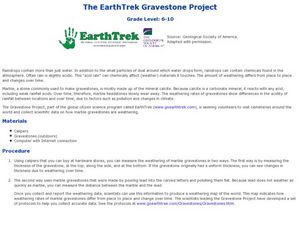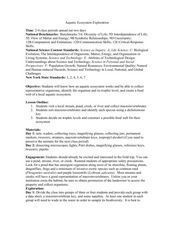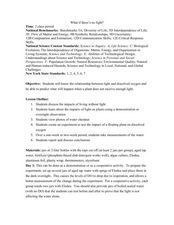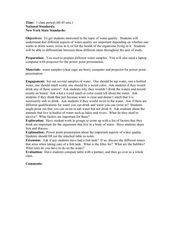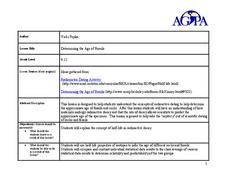Curated OER
Observing and Predicting Weather from a Weather Station
Fourth graders us a Weather Log data chart to record the date, time, day, and weather. They discuss different instruments and charts needed to record the information. Students turn in their weather logs at the end of two weeks and...
Curated OER
What things let Light Pass Through?
Second graders classify objects according to how well light can pass through them and predict how well objects will transmit light. They experiment with objects to verify predictions while collecting, recording, and interpreting data...
Curated OER
Chihauhan Desert Journaling Activity
Students explore U.S. geography by completing an observational activity with classmates. In this New Mexico lesson, students research the Chihuahuan Desert by visiting several Internet sites. Students write the data they've collected in...
Curated OER
Magnetic Force
Learners are introduced to the attraction and repulsion of magnetic forces. In groups, they observe how the forces react with different materials and record their data. They develop their own conclusions about the poles of magnets and...
Curated OER
Honesty In Reporting Research
Students view and discuss a video on dishonesty. Then they have a homework assignment to apply this discussion to household products that have resulted from scientific research which was falsified in order to get the product approved for...
Curated OER
Farming Fantastic Friends
Seventh graders demonstrate scientific inquiry to design and perform an experiment involving Grow Creatures. They participate in a class discussion, and in small groups design an experiment that determines how to change the materials to...
Curated OER
Apply Technological Design and Scientific Habits of Mind
Students work together to brainstorm their obstacles in testing different scientific principles. In groups, they are given a scenerio with a specific dilemma and they use the internet to research how to solve the problem. They design a...
Curated OER
How to Keep a Scientific Journal
Young scholars record observations of a living organism over a period of time. They observe meal worms and record their observations in a scientific journal.
Curated OER
In the Field with Salamanders
Students observe salamanders, take pictures of them, and classify them into an online format. In this animal classification instructional activity, students use collection materials and digital camera to photograph and observe...
Curated OER
Classification for Beginners
Students explore the process of classification. In this rock classification lesson, students conduct a scientific investigation that requires them to follow the provided steps to classify rocks.
Curated OER
Curiosity Does Not Kill The Cat
Students list the different ways they could test a guinea pig, a dandelion, and their brother (or sister)? They create a data chart in their group that lists the organism, what they could measure, and how they could change that measurement.
Curated OER
Let's Investigate Tooth Decay
Students conduct a simple investigation to explore tooth decay.
Curated OER
Careers in Science
Students learn the trends in the current job market for scientists,
find where the jobs are, the range of salaries, and the job requirements.
They discover that scientists do some very interesting things, then
write a letter of...
Curated OER
EarthTrek Gravestone Project
Students explore the effects of acid rain. In this acid rain lesson, students investigate the effects of the weathering from acid rain in different places. Students visit cemetaries to collect data about the effects of acid rain on the...
Curated OER
Making a Thermometer
Students observe a demonstration of how a thermometer functions. They apply the scientific method while determining which of three cups hold the coldest water. They write a hypothesis before conducting the experiment and gather data.
Curated OER
Vegetation Scavenger Hunt
Students use picture cards to familiarize themselves with plant structures and characteristics. They collect plant specimens without destroying the plant and mount them creating a class herbarium.
W.K. Kellogg Biological Station
Succession: Patterns in the Field and in Seeds
Have you been wondering how to use that natural trail at or near your school? This activity gets kids outside with a purpose: learn about ecological succession through field observations and collecting seed and soil samples. The resource...
Curated OER
Is Our Water Healthy?
High schoolers test water for a least one chemical characteristic. They hypothesize how a storm event might change the chemical characteristics of a stream. Students collect water samples and use the chemical test to test the water.
Curated OER
Aquatic Ecosystem Exploration
Students visit a local stream, pond, creek, or river and collect macroinvertebrates. They sort macroinvertebrates and identify each species using a dichotomous key. Students decide on trophic levels and construct a possible food web for...
Curated OER
What If There's No Light?
students discuss the importance of light and the consequences of living without it. Using a plant as a demonstration, students predict and observe what happens to a plant when it does not receive enough light. In groups, they experiment...
Curated OER
Water Quality with Samples
Students recognize whether one wants to drink water, swim in it, or for the health of the organisms living in it. They prepare different water samples to observe and collect samples regarding the water quality.
Curated OER
Determining the Age of Fossils
Students examine the concept of radioactive dating. In this radioactive dating lesson plan, students investigate how to determine the ages of fossils and rocks as they learn about half-life radioactive decay.
Curated OER
Water Lesson Plan
Pupils discuss the importance of water in our daily lives. In this physics lesson, students calculate the pressure of water tower systems. They investigate the effect of certain variables using a computer simulation.
Curated OER
CAN'T TOUCH THIS!
Young scholars discover the best practical shielding material when dealing with radioactive substances. They draw conclusions based on availability of materials, price, and best shielding properties.



